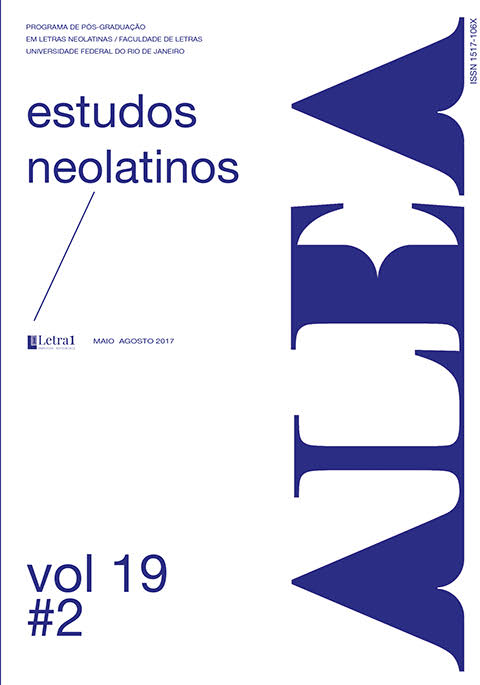Notas sobre o conceito de tradição em T. S. Eliot (à luz dos escritos filosóficos iniciais do autor)
DOI:
https://doi.org/10.1590/1517-106X/2017192291305Abstract
O presente artigo propõe-se a revisitar o conceito de tradição em T. S. Eliot à luz dos escritos filosóficos iniciais do autor, muitos dos quais publicados na íntegra pela primeira vez em 2014. Para tanto, o texto divide-se em três etapas fundamentais, voltando-se para a produção filosófica de Eliot, para a sua tese de doutoramento e para o clássico “Tradição e talento individual”, este último projetado contra a leitura de sua obra ensaística inicial. O que se espera mostrar, em linhas gerais, é que tradição, para o autor, constitui um corpo orgânico e provisório de obras capaz de negar-se a si mesmo e de reconstituir-se a todo instante.
Downloads
References
BADENHAUSEN, Richard. T. S. Eliot and the Art of Collaboration. Cambridge: Cambridge University Press, 2004.
CHINITZ, David E. T. S. Eliot and the Cultural Divide. Chicago: fte University of Chicago Press, 2003.
ELIOT, T. S. Ensaios. Tradução, introdução e notas de Ivan Junqueira. São Paulo: Art Editora, 1989.
____. For Lancelot Andrewes: Essays on Style and Order. Garden City: Doubleday, Doran and Company, Inc., 1929.
____. The Complete Prose of T. S. Eliot. Vol. 1 -- Apprentice Years, 1905-1918. Edited by Jewel Spears Brooker and Ronald Schuchard. Baltimore; London: John Hopkins University Press; Faber and Faber, 2014a.
____. The Complete Prose of T. S. Eliot. Vol. 1I -- The Perfect Critic, 1919--1926. Edited by Anthony Cuda and Ronald Schuchard. Baltimore; London: John Hopkins University Press; Faber and Faber, 2014b.
EMPSON, William. Seven Types of Ambiguity. Mitcham: Penguin Books, 1961. JAIN, Manju. T. S. Eliot and American Philosophy. Cambridge: Cambridge University Press, 1992.
KENNER, Hugh (ed.). T. S. Eliot: A Collection of Critical Essays. New Jersey: Prentice Hall, Inc., 1962.
LEAVIS, F. R. New Bearings in English Poetry: a Study of the Contemporary Situation. Ann Arbor: fte University of Michigan Press, 1960.
MENAND, Louis. Discovering Modernism: T. S. Eliot and His Context. 2. ed. New York: Oxford University Press, 2007.
PERL, Jeffrey M. Skepticism and Modern Enmity: Before and After Eliot. Baltimore: fte John Hopkins University Press, 1989.
PERRONE-MOISÉS, Leyla. Altas literaturas. São Paulo: Companhia das Letras, 1998.
POIRIER, Richard. The Performing Self: Compositions and Decompositions in the Languages of Contemporary Life. New Brunswick: Rutgers University Press, 1992.
SMITH, Grover (ed.). Josiah Royce's Seminar, 1913-1914: as recorded in the notebooks of Harry T. Costello. New Jersey: Rutgers University Press, 1963.
SCHWARZ, Sanford. Eliot's Ghosts: Tradition and its Transformations. In: CHINITZ, David E. A Companion to T. S. Eliot. Chichester: Wiley-Blackwell, 2009.
WIMSATT, W. K.; BEARDSLEY, M. C. A falácia intencional. In: LIMA, Luiz Costa (Org.). Teoria da literatura em suas fontes. Rio de Janeiro: Civilização Brasileira, 2002. v. 2.
Downloads
Published
Issue
Section
License
THE AUTHOR/S confirm/s his, her or their participation in all stages of work preparation: 1) Conception, project, bibliographical research, analysis and interpretation of data; 2) Writing and reviewing the manuscript; 3) Approval of the final version of the manuscript for publication; 4) Responsibility for all aspects of the work and guarantee for the accuracy and integrity of any part of the work. The submission of works implies the immediate cession, without onus, by all authors, of publication rights to the journal Alea, licensed under CC BY (https://creativecommons.org/licenses/by/4.0/). The authors are fully responsible for the content of the article and continue to hold all copyrights for subsequent publications of it, and should, if possible, include the reference to the first publication in the journal. Alea does not commit to returning received contributions. Authors of articles, reviews or translations will receive a copy of the journal.

